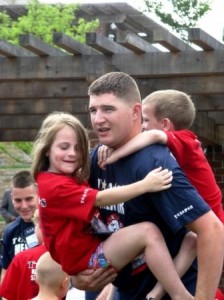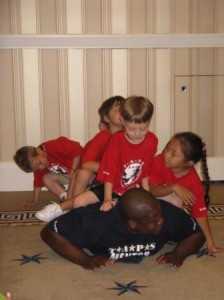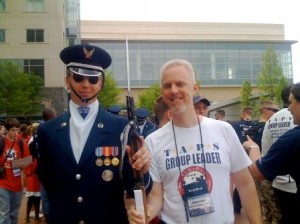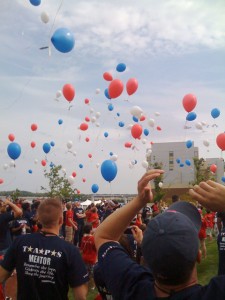Wednesday
Featured StoriesTender Heart in the American Military
“I’m scared,” said the six-year old boy.
“Why are you scared?” I asked.
“Because my dad is dead and I’ll never see him again, and coming to TAPS means knowing that.”
We were sitting in a circle in a conference room at a resort hotel on the Potomac just south of Washington DC. Seventeen six-year olds sat cross-legged on the thick carpet, with seventeen military “mentors” sitting beside them. It was the last day of TAPS (Tragedy Assistance Project for Survivors) Good Grief Camp, a weekend camp for military families who have lost an active duty member, and I was the group leader for the six-year olds. Me, with an FBI record for civil disobedience committed during the first Iraq war, a left wing pacifist, a one-time vegan. Me, Naropa graduate, Warrior of the DC Shambhala Center, gay, in a room filled with children from military families and active duty Marines, airmen, and soldiers. For the third year in a row.
Founded in 1994 by Bonnie Carroll following the death of her husband in an Army C-12 plane crash in 1992, TAPS has gradually established itself as the front line resource to families and loved ones of deceased military men and women. After the death of an active duty member, the family goes through countless changes. While they do continue to receive monetary support and benefits, they lose much of their community and social network. If they live on base, they must move away and find other housing. Often the family will move not just off base but to another place altogether. The children change schools, leaving friends and teachers who may have known the parent who died. Not only do they become the new kid in class, most likely they become the only kid who has recently had a parent die.
TAPS steps in at this point. An independent non-profit, TAPS operates 24 hours a day, seven days a week through comprehensive services and programs including peer based emotional support, casework assistance, crisis intervention, and grief and trauma resources. TAPS offers support to parents, grandparents, siblings, and children, regardless of the cause of death. In fact, TAPS has been on the forefront of caring for families affected by the rash of military suicides (CNN reports that attempted suicide has risen to the five times the “normal” rate in the military since the Iraq invasion).
Once a year on Memorial Day TAPS takes over a hotel in the Washington DC area and puts on the national TAPS Good Grief Camp for kids who have lost a parent, brother, sister, uncle or aunt. The way the camp works is this: every kid who has lost a loved one is assigned a mentor who spends the entire weekend accompanying the child in every activity. The children are organized into age groups, and each group is led by two team leaders—a military leader (often someone who has been a mentor for a couple of years) and a mental health professional. So, if a group of eleven-year olds has twenty kids who have lost a loved one, there are twenty mentors as well—and the mentors are often soldiers from one branch or another who have seen action and lost friends themselves. There is plenty of grief to go around.I have usually considered myself an anti-war activist. Baptist missionary parents, first in Beirut, then in Tehran, brought me up overseas. When I was a young kid, a bomb went off in the apartment building where we lived. In fifth grade, Palestinian guerillas kidnapped my father. In the winter of 1978 in Tehran, my family stapled our curtains to the windows in case a firebomb was thrown in through the glass. I never graduated from high school. I had planned on it, but the Shah left the country and the school closed.
After college I moved to Washington DC where I lived in a Catholic Worker community—an anarchist collective inspired by the life and writings of Dorothy Day, a communist-turned-Catholic who lived a life of service and political activism. These were the days of the Reagan presidency, and I got busy protesting against the wars in Nicaragua, El Salvador, and Guatemala, attending weekly vigils at the South African embassy against apartheid and at the Pentagon opposing military spending. I spent time in jail for gay rights, for breaking into a nuclear submarine base, and for trespassing onto nuclear test sites in Nevada. During the first Iraq war, housemates of mine stole onto an Air Force base at night and hammered on the fuselage of a B-52. During their trial, I was escorted out of the courtroom by the marshals for disrupting the proceedings by reading out a list of the Iraqi dead. Those are my anti-war activist credentials.
Just three years ago, I was listening to the news on NPR. An item caught my attention, an interview with Bonnie Carroll, the founder of TAPS. Hearing that interview, I realized things had become different for me. For one, I had been sitting and practicing for 15 years. The importance of this conditioning cannot be underestimated. I had become more detached from my identity as a left-wing peace activist. Space had now opened up in my head to move in and out of, well, worlds other than my own. I had confidence, too, that I could throw myself into something foreign, see what came up, and work with it. Quite simply, I was not as identified with my story line and not as reactive to other people’s story lines.For another thing, some members of my family, instead of becoming peace activists, joined the military. My nephew John was serving his first of two deployments in Iraq. My brother Tom, an Air Force pilot, had flown many missions in and out of the Baghdad airport, and my oldest brother Jim had just been called up and placed on active duty. At 52, he was preparing to leave for Iraq to become a chaplain for soldiers wounded by IEDs (improvised explosive devices) and snipers.
I was against the war in Iraq. My family was against the war in Iraq. Could I be against the war and actually support the troops? Was there a way to do that? I wanted to; after all, the troops were my family.
So, following the interview, I looked up TAPS on the web and sent an email. I let them know that I was a civilian, but I had family serving in Iraq, and was a licensed psychotherapist. If there was anything I could do—would they let me know? A few days later I heard back. There was something I could do. If I were available, could I co-lead the group for eleven-year olds?
I said yes, and almost instantly got nervous. My “us versus them” anti-war mentality had not entirely dissolved. I was a stranger in a strange land as I drove up to the Sheraton Hotel in Arlington where camp would be held. I parked my car and entered the “them” world.
In my first year as team leader for the eleven-year olds, I spent the weekend with 20-year old Marines who had lost buddies in Afghanistan, with Air Force Honor Guard who spent their days at Arlington National Cemetery, with 24-year old Army widows raising three kids. In my group was a child who lost her older brother in Iraq and then her father, when, serving in Afghanistan, he committed suicide upon hearing of his son’s death. I had kids whose dads were killed by IEDs and kids whose dads drowned in tanks that fell into the Euphrates River.
My experience was overwhelming, but very real. Kids were asked to draw pictures of their family before and after the loved one died. In groups, the kids talked about what they missed most. Kids were taught to recognize grief and to work with anger. Mentors held kids when they cried, played games with them, and accompanied the kids on a tour of DC, hitting all the major memorials. On the very last day of camp, the children wrote notes to their loved one who had died; those notes were attached to red, white and blue balloons, and during a 15 minute ceremony when all air traffic at National Airport (just a mile away) was stopped, the balloons were released from the park outside.As the balloons rose in the air, a gust of wind blew by, and instead of heading straight up, several of the balloons became entangled in the trees that lined the park. As I watched, young service men hoisted each other up and climbed into the trees, freeing the balloons. For some reason, this moment was one of the most moving experiences for me. It pointed so clearly to the compassion that was evident all weekend long. When I thanked one of the mentors who had scrambled up a tree to free several balloons, he responded, “Yes sir, I would do anything to make sure these kids’ letters get to their loved ones in heaven.”
And so for me, compassion has become the key to how I fit in and the reason why I have returned three years in a row. Its one thing for me to theorize that the tender heart of sadness is bigger than Shambhala Training or taking bodhisattva vows, but to experience it so vividly among an entire class of people I had so easily dismissed has been a wake-up call for me. As angry as I have felt about the US’s role in the ongoing war in Iraq, every year I have left TAPS with a surprisingly deep sense of trust in my country and in the military. The Kingdom of Compassion seems to have citizens just about everywhere.





















Jan 24, 2011
Reply
Thank you, my brother. You have a great heart and glad I am a part of it. You are wonderful at TAPS.
Aug 17, 2010
Reply
Hi Jon, I’ve thought of you often and wondered where you landed (or if you landed)
since you left Boulder many moons ago. On a whim, I did a google search and up
came this wonderful article. It didn’t surprise me one bit that you’d be working your
heart magic with military children. Would love to hear from you.
Nov 9, 2009
Reply
yeah i can see all tender in iraq’s inccent ppl just type (( tourching in iraq)) and enjoy the tenderness as it should be one day u will pay the price for that usa military
Sep 4, 2009
Reply
Jon, Once again I say ” I’m VERY proud to have you as a SON-IN- LAW.
Aug 18, 2009
Reply
Jon, Richard and I met you briefly at International Baptist Church in Brussels and later in Raleigh, NC. Your mom and dad are precious people in our hearts.
If we’d all focus on what we are able to change to make the world a better place instead of hammering on B-52’s we’d probably accomplish more. You are certainly making the world a better place for some very special children.
Aug 18, 2009
Reply
dear jon,
this is a wonderful story and wonderfully written- you should consider a writing career as an additional
career, as if you had more time. i know, you don’t have a free moment. makes me even happier that we could
go to dinner.
but most importantly, i am so proud of you and grateful for all you’re doing. this TAPS work is especially
impressive and important.
salaams to your dear partner, too.
nancie
Aug 17, 2009
Reply
Jon,
Indeed, “Mercy (compassion) triumphs over justice” (Ja. 2:13). You seem to have found you niche and we are very happy for you.
Aug 17, 2009
Reply
Jon Your family lived across the street from us in Lyon Ms when your father was pastor of Lyon Baptist Church and we were very close. Can’t remember you but Jim stayed with us a lot. I did love reading your article and think you are filling one of the needs of this world..
Aug 13, 2009
Reply
Very cool, Jon – thanks so much for this. I was raised in a military family, often separated from my mother and sisters (due to marital strife between parents) and always living – until age 17 – with a distant father who grappled with his closeted gay sensibilities. No matter what the circumstances, American military kids have it rough: frequent moves and/or parents away, financial limitations and challenges, a society that alternately idolizes the idea of the military but in fact doesn’t appreciate the difficulties. A mixed bag, to be sure. Your story about TAPS and the artful, enduring and vibrant responses of young people is again an inspiration to all of us, regardless of our own circumstances and fortunes. Thanks!
Aug 12, 2009
Reply
Jon, great article! It’s good to learn more about you.
It’s been a great honor working with you, as part of the TAPS family, over the past three years! It takes a special person to volunteer their time to help these kids deal with their grief in a constructive way.
You brought up another point that we don’t often talk about with TAPS. Everyone associated with TAPS certainly has their own personal beliefs…. but we put that aside for the Memorial Day weekend. Knowing more about you now, I admire your efforts even more!
Thanks again for all that you do. See you in roughly eight and a half months at the next TAPS!
Take care,
Rob